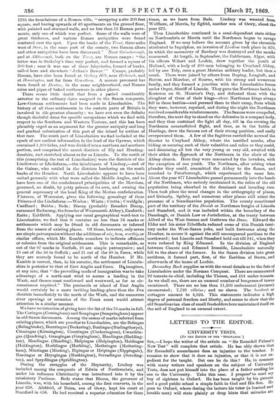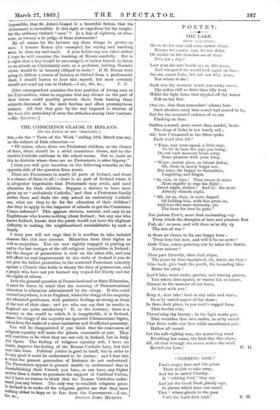LETTERS TO THE EDITOR.
UNIVERSITY TESTS.
[TO THE EDITOR OF THE " EPROTATOR.1
hope the writer of the article on "Sir Roundell Palmer's New Test" will complete that article. He has ably shown that Sir Roundell's amendment does an injustice to the teacher. It remains to show that it does an injustice, or that it is not expedient for the taught. But can he do this ? He, in common with many writers and speakers on the subject of University Tests, does not put himself into the place of a father sending WS son to the University. Take this case. I propose to send my boy of eighteen to Oxford. He has been taught by his parents and a good public school a simple faith in God and His Son. He goes to Oxford, where during the lecture his tutor (a learned and lovable man) will state plainly or drop hints that miracles are
impossible, that St. John's Gospel is a beautiful fiction, that the Atonement is incredible. Is this right or expedient for the taught, for the ordinary Oxford " man "? Is a boy of eighteen, or nineteen, or twenty a fit judge of these statements?
By all means let the lecturer say these things to grown-up men. I honour Renan (for example) for saying and teaching what he does say and teach. A year before my son takes orders I hope he will examine the teaching of Renan carefully. But is it right that a boy should be encouraged, or rather forced, to listen to an attack on Christianity such as a professor, holding Renan's views, would be in honesty obliged to make ? If M. Renan were going to deliver a course of lectures at Oxford from a professorial chair, I should hasten to hear him myself, but most certainly should not send my son to Oxford.—I am, Sir, &c., F. P.
[Our correspondent mistakes the true position of young men at the Universities, when he supposes that any silence on the part of their tutors could possibly prevent them from hearing these subjects discussed in the most fearless and often presumptuous manner. All that they gain by the test imposed is distrust of the bond fide orthodoxy of even the orthodox among their teachers. —En. Spectator.]



































 Previous page
Previous page